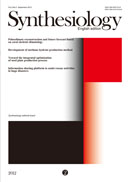Volume 5, Issue 2
Displaying 1-8 of 8 articles from this issue
- |<
- <
- 1
- >
- >|
Research papers
-
2012Volume 5Issue 2 Pages 78-87
Published: 2012
Released on J-STAGE: December 27, 2012
Download PDF (3113K) -
2012Volume 5Issue 2 Pages 88-95
Published: 2012
Released on J-STAGE: December 27, 2012
Download PDF (2141K) -
2012Volume 5Issue 2 Pages 96-113
Published: 2012
Released on J-STAGE: December 27, 2012
Download PDF (2263K) -
2012Volume 5Issue 2 Pages 114-127
Published: 2012
Released on J-STAGE: December 27, 2012
Download PDF (7847K)
Round-table talk
-
2012Volume 5Issue 2 Pages 128-133
Published: 2012
Released on J-STAGE: December 27, 2012
Download PDF (564K)
Editorial board
-
2012Volume 5Issue 2 Pages 134-135
Published: 2012
Released on J-STAGE: December 27, 2012
Download PDF (243K) -
2012Volume 5Issue 2 Pages 136-137
Published: 2012
Released on J-STAGE: December 27, 2012
Download PDF (250K) -
2012Volume 5Issue 2 Pages 138
Published: 2012
Released on J-STAGE: December 27, 2012
Download PDF (236K)
- |<
- <
- 1
- >
- >|
